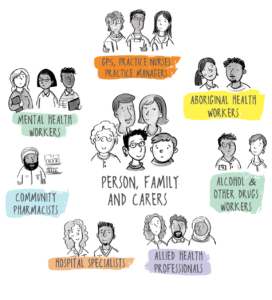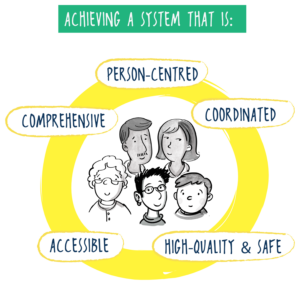Primary care
We are advocates for general practices and other primary care providers in our region and beyond. We believe that a robust and well-resourced primary care sector is an essential element of a healthy community.
 It is the foundation of our vision for a primary care system that is person-centred, comprehensive, coordinated, accessible, high-quality and safe.
It is the foundation of our vision for a primary care system that is person-centred, comprehensive, coordinated, accessible, high-quality and safe.
To make this possible NWMPHN:
- co-designs and administers quality improvement programs for general practices wanting to expand patient care provisions in areas as diverse as family violence response and eye health
- manages expression of interest procedures for state and Australian government grants for extension or improvement of practice
- hosts certified training sessions, webinars and courses to upskill clinical practice and administrative procedure
- creates and distributes a range of direct-communication general practice bulletins, newsletters and alerts
- advocates to government for changes to practice and regulations that represent barriers to good general practice management and function.
Building the health care system
 NWMPHN is a trusted partner of the state and Australian governments in overseeing and managing major primary health care projects, within the region, across the state and nationally. For instance, we have played – and continue to play – leading roles in the development of general practice respiratory clinics, priority primary care centres, the Doctors in Secondary Schools program, the Head to Health mental health intake and referral system, the CAREinMIND™ mental health free treatment system, and the Victorian HIV and Hepatitis Integrated Training and Learning program (VHHITAL).
NWMPHN is a trusted partner of the state and Australian governments in overseeing and managing major primary health care projects, within the region, across the state and nationally. For instance, we have played – and continue to play – leading roles in the development of general practice respiratory clinics, priority primary care centres, the Doctors in Secondary Schools program, the Head to Health mental health intake and referral system, the CAREinMIND™ mental health free treatment system, and the Victorian HIV and Hepatitis Integrated Training and Learning program (VHHITAL).
Advancing cross-sector innovation
While focused on primary health care, NWMPHN also recognises that strong ties with the secondary and tertiary sectors can produce beneficial change across the community.
To this end, the organisation has developed deep and enduring relations with other major health organisations, including The Royal Melbourne Hospital, The Royal Children’s Hospital, Murdoch Children’s Research Institute, Western Health, cohealth and Cancer Council Victoria. This has led to some innovative cross-sector progress, including pilot programs to put embed pharmacists and paediatricians into general practice setting.
The results have been remarkable and have included the development of the first-ever COVID-Positive Pathway and the Strengthening Care for Children model – both of which have resulted in peer-reviewed papers in major medical journals.
Designing and delivering targeted care within the community
Through collaboration, co-design and commissioning NWMPHN works with general practice, community health, mental health and other allied health entities to deliver programs that meet the needs of at-risk residents.
Each year we partner with more than 100 organisations to deliver results in fields as diverse as suicide prevention, sexual health training, mental health therapies, exercise in residential age care, chronic pain management, cancer screening, alcohol and other drugs counselling, asthma care, diabetes care, in-reach vaccination and pharmacy.
To discover our partners, start here.
Working with community members
At NWMPHN we believe that the value of lived experience is immeasurable. When designing health care programs we hold that the insight of consumers is as valid as that of experts and practitioners.
For that reason we celebrate the contributions of those with lived experience in the development of programs within many areas, including Aboriginal and Torres Strait Islander, LGBTIQ+, and culturally and linguistically diverse communities.
We also maintain People Bank, through which community members are invited to provide feedback and advice on health matters relevant to their own communities.




